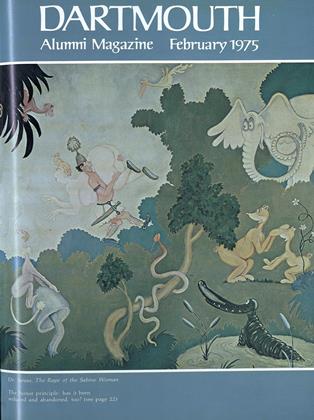FAT MUTTON AND LIBERTY OF CONSCIENCE: SOCIETY IN RHODE ISLAND, 1636-1690.
February 1975 LOUISE RIEGELFAT MUTTON AND LIBERTY OF CONSCIENCE: SOCIETY IN RHODE ISLAND, 1636-1690. LOUISE RIEGEL February 1975
By Carl Bridenbaugh'25. Brown University Press, 1974. 155 pp.$8.
With this book, Professor Bridenbaugh refutes the prevailing notion that it was the failure of farming which drove the 17th-century Narragansett men down to the sea and graphically documents a prosperous society far different from the renegade colony castigated by its jealous rivals and dismissed by superficial historians.
The Colony of Rhode Island and Providence Plantation evolved from the alchemy of superior people, abundant natural resources, a hospitable climate and topography, virtually no predators, and a modicum of happy chance.
These English dissenters who originally fled the "most progressive counties of England' followed out of Massachusetts the trails blazed by Roger Williams and Anne Hutchinson. They settled their households and livestock around the quiet waters of Narragansett Bay and on its clustered islands. In seven years, they established a viable rural society. Wasting nothing bestowed on them, they soon raised and made more than was needed and marketed the surplus north to Boston and south to Dutch Manhattan, transporting by an infant shipping business sprung from the abundant timber at their back door.
This socio-economic stability attracted more hardy settlers and certain wealthy investors whose vision embraced the possibilities of 70,000 fertile acres. Much agricultural and stock experimentation ensuing from the English system was widely implemented; abundant grazing land and a bay teeming with fish produced substantial income; and, inevitably, the ketches and shallops were followed by sloops, barques, and schooners outward bound for the West Indies, Europe, and Africa. Rhode Island's envious sister colonies competed for her custom.
Chartered finally in 1663 by Charles 11, Rhode Island's seemingly irresistible expansion was interrupted by two conflicts with the Dutch (1665-67; 1673-74) and King Philip's War (1675-1676). It had been harassed from the outset by Massachusetts' resentment over the exodus of many able inhabitants seeking the greater religious freedom of the Providence Plantation. Among these were wealthy Antinomians who left the Bay Colony in 1637 and found the Quaker environment so congenial that by 1665 most of the sect declared themselves "convinced Friends."
Any account of Quaker history must pay homage to the dynamic genius of George Fox whose two-month visit in 1762 ensured the preservation of the colonial Society by uniting it with the religious, political, and economic organization he had established in Barbados, Ireland, and England.
This book, testimony to Professor Bridenbaugh's meticulous research and documentation, illuminates our indebtedness to our colonial forebears. It is also typical of the fine work of the Brown University Press.
Louise Riegel, wife of Robert Riegel, Professorof History Emeritus, is a long-time student ofAmerican history.
 View Full Issue
View Full Issue
More From This Issue
-
 Feature
FeatureStar Birth, Star Death, and Black Holes
February 1975 By DELO E. MOOK -
 Feature
FeatureHONOR: The Vanishing Principle
February 1975 By JAMES A.W.HEFFERNAN -
 Feature
FeatureThe Great Rip-off
February 1975 -
 Feature
FeatureSome People Are Good Skiers
February 1975 By V.F.Z. -
 Article
ArticleThe Gospel According to Marcus
February 1975 -
 Article
ArticleFurther Mention
February 1975 By J.H.
Books
-
 Books
BooksFACULTY PUBLICATIONS
May 1921 -
 Books
Books"Selected Articles on the Pact
APRIL 1929 -
 Books
BooksShelf Life
July/August 2012 -
 Books
BooksTHE MAKING OF AN ARAB NATIONALIST: OTTOMANISM AND ARABISM IN THE LIFE AND THOUGHT OF SAT I' AL-HUSRI. "
JUNE 1972 By GENE R. GARTHWAITE -
 Books
BooksBUCKS COUNTY: PHOTOGRAPHS OF EARLY ARCHITECTURE.
January 1975 By JOHN HURD '21 -
 Books
BooksCHRETIEN DE TROYES: INVENTOR OF THE MODERN NOVEL.
March 1958 By WILLIAM R. LANSBERG '38


